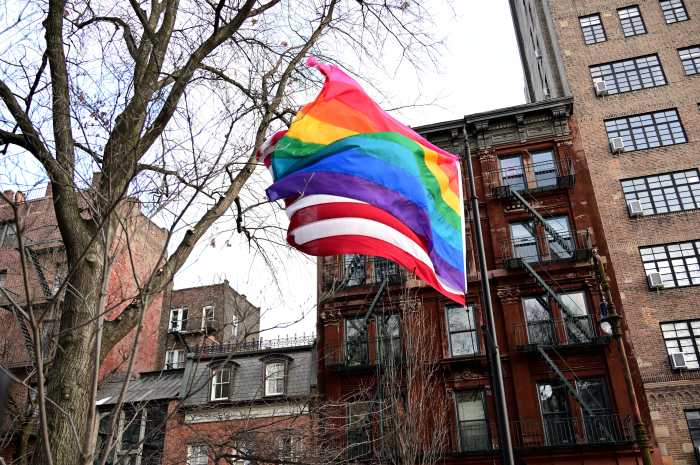With a federal lawsuit filed April 10 by Lambda Legal on behalf of eight gay and lesbian couples seeking marriage rights in Nevada, the push for equality has expanded to yet another front.
For the first time, the federal courts will directly confront the question of whether a state that grants same-sex couples “the same rights, protections, and benefits” and “the same responsibilities, obligations, and duties” as marriage — as Nevada’s 2009 comprehensive domestic partnership law does — can deny them full marriage equality.
Less than three years ago, when the American Foundation for Equal Rights (AFER) was launched to challenge California’s Proposition 8, Lambda joined other leading LGBT litigation groups in criticizing the move in a publication titled, “Why the United States Supreme Court is not the next step on marriage in California.”
The groups, also including Freedom to Marry, the Gay & Lesbian Advocates & Defenders, the National Center for Lesbian Rights, and the American Civil Liberties Union, stated their aim was to “discourage people from bringing lawsuits based on the federal Constitution because it is unlikely the US Supreme Court would rule that same-sex couples cannot be barred from marriage.”
Those groups — recognizing, as University of Pennsylvania Law Professor Tobias Wolff wrote on the Huffington Post shortly after the AFER suit was filed, that the “die has been cast. Now, it is time for an all-hands-on-deck approach to this important effort” — soon came around and even sought, unsuccessfully, to intervene in support of the suit.
Now, Lambda joins AFER in going into US court to argue that a claim for marriage rights can be based in federal constitutional rights.
The Lambda suit comes just eight days after the latest federal challenge to the Defense of Marriage Act (DOMA) — Immigration Equality’s lawsuit in New York’s Eastern District in Brooklyn on behalf of five gay and lesbian legally married couples, in each of which one of the spouses is a foreign national with no right to stay in the US. The DOMA cases do not involve the right to marry, but rather challenge the 1996 law’s prohibition on federal recognition of otherwise valid marriages simply because the spouses are of the same sex.
In the Prop 8 case, District Judge Vaughn Walker, in a sweeping August 2010 ruling, found that the right to marry was “fundamental” and that the 2008 voter initiative violated the due process and equal protection rights of same-sex couples. The scope of that ruling raised the prospect that the right to marry under the federal Constitution could go before the US Supreme Court.
In February, however, a three-judge panel of the Ninth Circuit Court of Appeals upheld Walker’s decision, but on considerably narrower grounds. The panel found that there was no rational basis for depriving same-sex couples of rights they had enjoyed since the California Supreme Court granted marriage equality in May 2008. The only plausible explanation for the amendment’s enactment, the court found, was constitutionally impermissible animus and moral disapproval. The Proponents of Prop 8, who are defending the amendment, are currently seeking a rehearing by a larger Ninth Circuit panel.
The Nevada lawsuit raises issues similar to those addressed in the three-judge panel’s ruling. The Lambda brief, which names Governor Brian Sandoval and several local officials with responsibilities for issuing marriage licenses, claims the state’s statutory and constitutional bans on marriage by same-sex couples are “not tailored to a compelling state purpose or even reasonably related to a legitimate state purpose.” Lambda argues that Nevada’s ban on gay marriage should be subjected to a heightened level of judicial scrutiny — requiring the state to show a “compelling” justification — but also contends that even under the most lenient review, the state cannot counter the claim that it has no legitimate rationale at all.
A critical component of Lambda’s argument is the assertion that same-sex couples are “similarly situated to different-sex spouses in every relevant way.” A key provision of the suit reads, “As the State has acknowledged by granting same-sex registered domestic partners virtually the same family, parenting, and relationship rights and responsibilities as spouses enjoy and by prohibiting discrimination based on sexual orientation… neither Plaintiffs’ sexual orientation nor their sex bears any relation to their worth as committed life partners or parents, or their ability to contribute to society.”
Nevada’s ban on marriage equality and relegation of gay and lesbian couples to “a separate-and-unequal status that is demonstrably inferior,” then, “reflect moral disapproval and antipathy toward lesbians and gay men,” a ground rejected by the US Supreme Court.
The Lambda suit does not raise the due process claim made by AFER in the Prop 8 case that led Walker to find that marriage is a “fundamental right” — a holding that, if upheld at the Supreme Court, would be the whole ballgame in the drive for marriage equality. The Nevada case does not specifically pose the question of whether gay or lesbian couples generally have the right to marry.
Peter Renn, a Lambda Legal staff attorney, told Gay City News that while the group believes that “the fundamental right to marry includes same-sex couples… We are convinced that our equal protection claim is so clearly correct that we want to keep the focus there.”
The focused nature of the Lambda suit does not mean that its implications are not profound. If this litigation ultimately proves successful, its precedent would presumably apply in other states with comprehensive civil union and domestic partnership laws, such as New Jersey, Delaware, Illinois, Oregon, and Hawaii.
Its implications on the broader question of whether the equal protection rights of any same-sex couple are violated when they are prevented from marrying are less clear, but some federal judges — perhaps Supreme Court justices among them — are likely to see this case as a slippery slope toward full marriage equality nationwide.
The Lambda plaintiffs include eight Nevada same-sex couples, four of whom were denied marriage licenses in the state. The other four were legally married in other jurisdictions, but their marriages are not recognized by the state of Nevada.
The Immigration Equality suit, which names Attorney General Eric Holder, Homeland Security Secretary Janet Napolitano, and several federal immigration officials, was brought on behalf of five gay and lesbian couples from Vermont, Connecticut, and New York. Each of them are legally married, in one of those three jurisdictions or, in one couple’s case, in South Africa.
Like the Nevada and Prop 8 litigation, Immigration Equality also raises equal protection arguments, asserting that DOMA’s bar on recognizing legal marriages by same-sex couples violates the equal protection rights guaranteed by the Fifth Amendment.
If the AFER and Lambda lawsuits about gay and lesbian couples’ right to marry ultimately implicate the question of whether that right has a federal constitutional basis, the Immigration Equality and other challenges to DOMA seek to curb the federal government’s intervention, to date, on the question of marriage.
“DOMA,” the Immigration Equality suit states, “creates, for the first time in our nation’s history, a federal definition of marriage that excludes same-sex couples.”
The implications of that for bi-national couples, the group’s filing makes clear, are particularly dire — determining whether a family can remain together in the US or potentially “be torn apart.” The suit notes that “the federal government also has set the preservation of families as a national priority” in its immigration policies, but adds, “Ironically, it is the federal government that threatens to tear bi-national couples apart.
Each of the five couples have filed I-130 applications that would typically allow a foreign national family member to stay in the US. Those applications have either been denied or will be unless the courts intervene.
In reviewing DOMA’s legislative history, the lawsuit identifies six justifications, which it proceeds to challenge. There is no logical relationship between the law and the protection of heterosexual marriage or the encouragement of heterosexuality generally. It does nothing to protect the sovereignty of the individual states, especially given that the legal marriages in six of them and the District of Columbia are now denied federal recognition. Nor does DOMA “preserve scarce resources” that would be depleted by benefits given to more married couples; a study by the Congressional Budget Office, the suit notes, found the law costs the federal government billions of dollars.
Immigration Equality also takes on the argument most frequently endorsed by judges across the nation — that banning gay marriage promotes “responsible procreation” by heterosexuals. There is no logic there, either, the suit asserts; instead, children of same-sex parents are “injured” under the law.
“Surely the real motive behind DOMA,” Immigration Equality asserts, is “moral disapproval of homosexuality,” something the US Supreme Court found was an impermissible ground as early as 1996, when it struck down a Colorado amendment that barred state and local governments from enacting gay nondiscrimination protections.
The litigation on behalf of the five bi-national couples follows promising results in other DOMA challenges. In 2010, a federal district court judge in Boston found that DOMA violated the equal protection rights of gay and lesbian couples who had married in Massachusetts. Although the plaintiffs, represented by the Gay & Lesbian Advocates & Defenders, asserted that their equal protection claim merited a heightened level of judicial review, Judge Joseph L. Tauro found that DOMA failed even the most lenient standard — the government could not rebut the claim that the law had no rational basis at all.
That case was coupled with a lawsuit by the Commonwealth of Massachusetts, which claimed that in several joint federal-state programs it was forced to discriminate against married same-sex couples on the basis of sexual orientation, in violation of its own state law. Tauro ruled that DOMA violated the Tenth Amendment by usurping authority left exclusively to the state.
Oral arguments in appeals of Tauro’s rulings were heard by the First Circuit Court of Appeals in Boston on April 4.
Earlier this year, District Judge Jeffrey S. White in San Francisco, in a case brought by Lambda, found that DOMA violated the Fifth Amendment equal protection rights of Karen Golinski, an employee of the Ninth Circuit Court of Appeals, who was denied insurance coverage for her same-sex spouse. White’s equal protection ruling went further than Tauro’s in Boston. He concluded that the sexual orientation discrimination in DOMA was subject to heightened scrutiny, and found there was no compelling government purpose in the law sufficient to justify it. Hedging his bets against a reversal on appeal, however, he also ruled that the law had no rational basis either.
A significant factor in all of the DOMA litigation is the absence of the Obama administration in defending the 1996 law. In February of last year, Attorney General Holder announced that the Justice Department had concluded that disparate treatment based on sexual orientation is subject to heightened scrutiny, a standard under which it found DOMA to be unconstitutional. The DOJ conclusion came in connection with lawsuits filed in Hartford and New York, including one brought by Edie Windsor, an 82-year-old New Yorker who is the widow of Thea Spyer, with whom she spent 44 years until Spyer’s death in 2009. Married legally to her late wife in Canada, Windsor now faces hundreds of thousands of dollars in estate taxes due to lack of federal recognition of their union.
Defense of DOMA in the ongoing litigation is now in the hands of a private attorney hired by the Republican leadership of the House of Representatives.






































